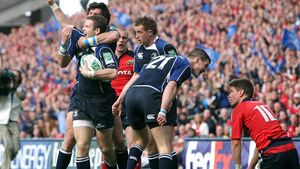Sexton’s raw memoir breaks the mould

Jonathan Sexton exchanges words with Ronan O'Gara as Leinster's Gordon D'Arcy celebrates his try with Shane Horgan and Luke Fitzgerald during the 2009 Heineken Cup semi-final against Munster. Picture: INPHO/James Crombie
There was a time when sports biographies were riveting page turners, a precursor to some of the gripping behind-the-scenes documentaries on streaming platforms today.
But somewhere along the way, Irish sports biographies became about as interesting as a wet Thursday on Inishkea. Towards the end of every year, just before the first of the Christmas ornaments arrive on shop shelves with an unwelcome thud, a plethora of biographies begin tentatively entering the market. Every cover is the same – a grim-faced headshot of the subject, just so the buyer can be in no doubt regarding its contents.
And once the cover is turned over, that theme continues. Rarely do the books produce anything worthy of a headline, with the retired sportsperson seemingly terrified of saying anything that may impact their relationships with former teammates or take an advantage away from them in the sporting arena. In fact, it's an extraordinary feat that ghostwriters are capable of churning out 300 pages of gruel so consistently.
There is no doubt that men and women who spent years immersed in the world of elite sport have stories to tell from the heartbreak to the fall-outs to the celebrations that got out of hand. Instead of that, readers are given self-congratulatory pats on the back, complete with the obligatory recurring motif on sports psychology that fostered the mentality that brought so much success.
There's no obligation on sportspeople to detail their lives in the arena to the public after they call it a day. But should they decide to share details, they should give those that are willing to part with their hard earned cash at least a sliver of respect.
But Johnny Sexton has never been a man to follow formulas. He didn't make his international debut until he was 24 years of age. He left these shores for France when no other player dared to be so brazen. And he's always played on the edge. For those reasons, it's perhaps no surprise that his new autobiography seems to be manna from heaven.
Excerpts of , which will appear on bookshelves later this week, appeared exclusively in the Sunday Times at the end of last month. And they didn't fail to disappoint. The former Irish and Leinster fly-half revealed all, from Warren Gatland's controversial decision to leave him out of the 2021 Lions Tour in South Africa to his rocky relationship with Ronan O'Gara at the beginning of his career to the fallout from Ireland's quarter-final defeat at the World Cup that saw the Irish captain lock horns with the All Blacks' Rieko Ioane.
"I never heard from Gats," he wrote when describing his disappointment at not being picked for the latest Lions Tour. “He wasn’t obliged to call me, of course. I didn’t expect a call."
The 39-year-old went on to add, "I still get the occasional urge to call him and find out, off the record, exactly what was said in the selection meeting. You’d probably think I’d be over it by now. It kills me to this day."
And while Sexton has had a cordial relationship with O'Gara since he worked with him during his time with Racing Métro in France, the animosity between the pair when Sexton first arrived on the scene has always been well documented. The book doesn't shy away from sharing some of the spicy details from the front line of that relationship.
During a particularly tense moment on the field, Sexton revealed that he squared up to the Munster man, even drawing his fist back as tensions flared, and calling his opponent a coward as he winced. Naturally, O’Gara opted against the diplomatic route and fired a grenade back in the direction of the Leinster man.
"Call me a coward? You’re nothing. You’re useless! A nobody," he said, with Sexton then admitting that he let those words fester for future ammunition. It’s exactly the type of content that should be included in all sports biographies.
But the most revealing of the excerpts detailed the aftermath of Ireland's exit from the 2023 World Cup at the hands of the All Blacks. There was no love lost between Ireland and New Zealand at the time. There had been tension stemming from Ireland’s previous tour of New Zealand, which saw Ireland win their first-ever tour in the country. And that carried over to the World Cup, which saw the All Blacks enact revenge, prompting Rieko Ioane to insult the Irishman at the final whistle of their quarter-final: "Don’t miss your flight tomorrow. Enjoy your retirement, you c**t."
That was always going to set off a spark inside Sexton, who has always been known for a feisty edge he has never been keen to keep locked inside.
"So much for the All Blacks’ famous 'no dickheads policy’," Sexton wrote. "So much for their humility. I walk after Ioane and call him a fake humble f***er. It doesn’t look great, me having a go at one of them just after we’ve lost. But I can’t be expected to ignore that."
Strangely, the excerpts have received mixed reviews. There was naturally plenty of criticism from New Zealand, with former All Black Israel Dagg leading the condemnation, telling Sexton to "give it a rest" before adding that the Irish side "bottled it" in Paris.
The discourse has been a little disappointing, particularly since revealing biographies have become somewhat of a dying art in recent years. Sexton's raw and honest take on his own career should be celebrated, regardless of your thoughts on his opinions and character.
But the intense criticism means we're unlikely to see more books like Sexton's in the future, with retiring players, who are already averse to revealing too much, likely to keep their memoirs as sanitised as possible in a bid to avoid suffering a similar fate to the former Irish captain.
That would be a tragedy for sport and storytelling.



